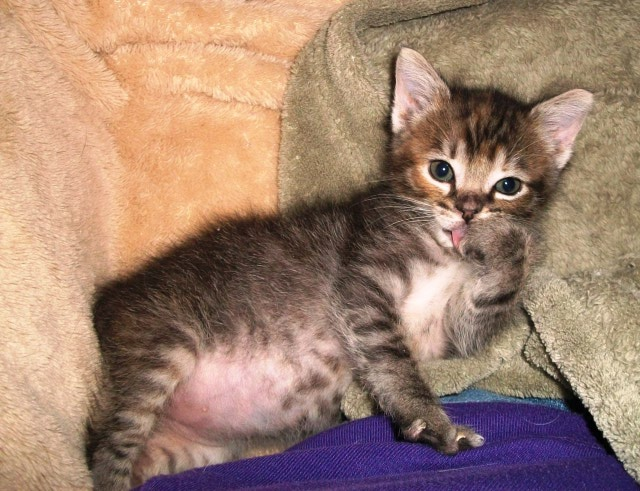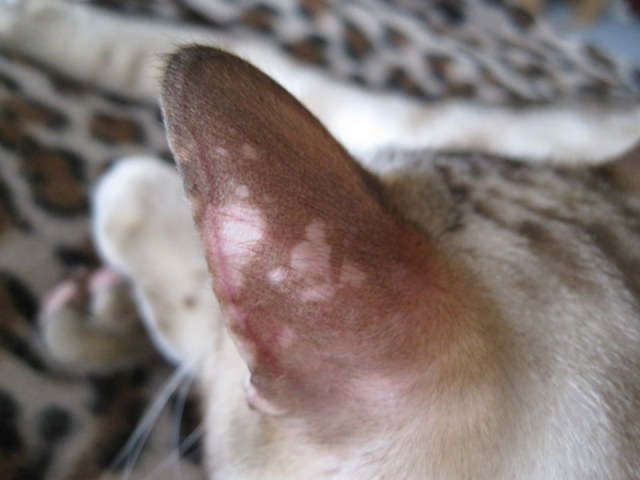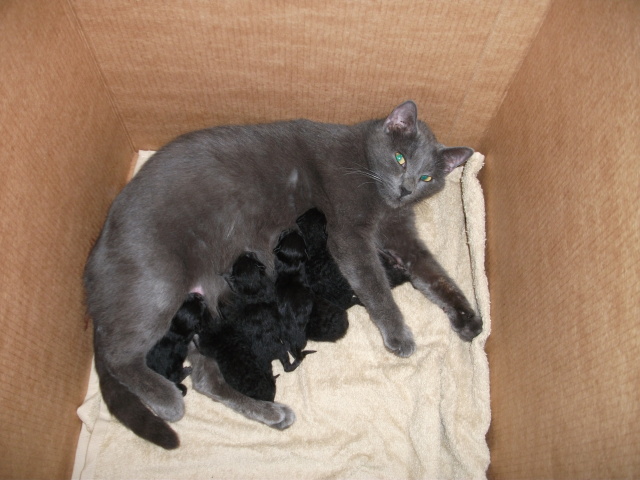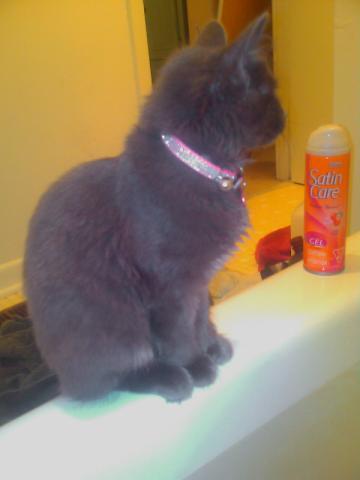Questionwe adopted our 2 cats 4 months ago a girl star and boy moon they are not related, every thing was fine until i went in to hospital with a heart attack then star got cat flu was almost over that when moon started to become active and she got a bite on her leg and foot. moon has now been neutered but he is such a big cat that his rough and tumble play is leading to more problems as star has been at the vet twice more for antibiotics and to have 2 lumps drained the first on her head the second on her neck. our vet made me feel like a rotten owner and has said that she is being bullied and that the only way to stop is to get rid of one of the cats not happening or open the door and let moon out as they are indoor cats as we live on a very busy main road so that is also not happening. the vet said the lumps were bruises and to keep the cats apart which i do when we are out but this cannot go on. star is not afraid of moon she seeks him out to snuggle and to play a lot of their playing she starts they both sleep with me though they have lots of nice warm beds dotted all over the house. when moon jumps on her it must be like a tone of bricks as he is such a big boy but its not nasty ie teeth and claws. i felt the vet was unfeeling and thought we were bad pet owners they cats own us more like. star has always been nervy and doesn't like my husband who is desperate for her to snuggle up with him the way moon dose she hisses growls and has bitten him but then when she is in the mood she will sprawl on him but i think its more she gives in to keep him sweet!! they are both wonderful with our daughter who is 4 and i don't want to get rid of as the vet put it either cat they are very much part of the family. im sure with a bit of help my cats could be sorted out and with a bit of time to heal star will be wanting all the play moon can dish out. i don't have much faith in our vets as they just want to dish out tablets without helping to fix the problem and i don't think telling me to get rid of a cat or let one out was the best advice so i hope you can help many thanks for your time Jill
AnswerJill,
This is a difficult situation made more difficult by a veterinarian lacking in tact, sensitivity and proper knowledge about basic feline behavior. My recommendation would be to consider trying out some homeopathic remedies. I'm not sure how you initially introduced these two cats to each other since they're not related, an improper introduction may be the reason for the issues you've been having. I generally recommend that pet parents consider putting the new cat behind a closed door for a minimum of 2-3 weeks to help the established cat become comfortable with the idea of a newcomer and the new kitty gets to become familiar with household routines and the smells and sounds his/her feline "sibling" makes. You can switch bedding and litter boxes back and forth between the cats so that they can investigate each other's scent in a completely non threatening way. Ideally you'll want to feed the two cats on either side of the closed door, once they've given up hissing, spitting, posturing, growling, etc with the door in place then you can consider using toys that would fit under a door (an old shoelace works well) to encourage the cats to play with each other through the door. Once they play comfortably and confidently with each other you can introduce them face to face with the new kitty in a cat carrier in case things get hairy, if all goes well they can progress to being together without any barriers in place. You can arm yourself with a spray bottle (not one recycled from household cleaners, I use the spray bottles you can get at any dollar store, set on stream they're perfect for this purpose) or a can of compressed air (like the one used to clean electronics and computer keyboards, etc....) cats generally get the hint quite quickly when a blast of compressed air is sent in their general direction - after all hissing is a warning that all cats understand. It's extremely important if you use the compressed air that you are very careful never to direct the nozzle directly at the cat's face or body in close proximity (say 3 or fewer feet of distance) because the cans contain propellents that can cause injuries like frostbite which you want to avoid if at all possible.
I've used Bach flower remedies for well over 10 years in my household for cats with a variety of issues and ultimately I've found them to be safe, effective and gentle ways to help cats overcome a variety of issues ranging from fear based behaviors to bullying. I generally administer Bach flower remedies by either gently rubbing them drop by drop into the cat's ear flaps or into the relatively fur free area of skin in front of the ear (just be sure you don't get any into the ear since the flower remedies are preserved in a grape alcohol base which can sting if it ends up inside the ear) - the majority of cats are offended by the taste and smell of these remedies for the same reason as you want to be sure to keep them out of eyes and ears so gently massaging them into the skin makes giving the remedies a much more pleasant experience for all involved (you can do this when you've got time to give each cat a cuddle and they'll enjoy taking their medicine if you're gentle and don't allow them to smell the dropper). You can find Bach flower remedies at most health food stores, naturopathic pharmacies, some pharmacies carry some or all of the Bach remedies in the aisle where you'd find herbal supplements and vitamins and if you aren't able to find the remedies locally at all then you can purchase them online from a variety of sites.
The first remedy that I'd recommend is Rescue Remedy, this remedy is a combination of 5 different flower remedies designed to calm and reassure which might be just the thing for Star to be more likely to stick up for herself (after all it's not the size of the cat in the fight, it's more like the size of the fight in the cat!). Here is a list of remedies you might find effective for one or both of your cats:
- Centaury which helps meek animals be more assertive.
- Chamomile which is calming
- Chicory for possessive pets.
- Elm which can be helpful if one or both of your fur kids is easily overwhelmed in situations.
- Heather if one or both cats is overly needy or clingy.
- Holly which is for jealous pets.
- Honeysuckle is a great remedy for shelter pets to help them recover from the traumas of shelter life.
- Impatiens can help if you've got a very impatient kitty on your hands.
- Larch can help to increase self confidence which might be good for your little girl kitty.
- Vervain which can be useful to help with hyperactivity and excessive enthusiasm.
- Vine is useful for dominant kitties.
***PLEASE NOTE: The goal is to treat the cats using as few remedies as possible. I'd recommend trying a single remedy on each cat for a few days, waiting a week or so to see how their behavior changes then trying another if necessary. Too many remedies may mean you don't know for sure which one works and in some cases one may cancel another out making two remedies useless to treat the issues you're dealing with. You can in theory use 2-3 remedies at the same time, but it's really best for all involved if you take things slowly, be patient and allow a single remedy time to work before trying another. Since the remedies are perfectly safe and won't affect a pet who doesn't need them you may also administer these remedies in the household water bowls for both cats, but I've found that administering these remedies as I've recommended above is more useful since homeopathic remedies are sensitive to light and temperature changes.****
Since you know your cats far better than I do you might want to check out the following website as it lists all of the Bach flower essences and what they're designed to do for pets (or humans), I have provided you with the names of a few remedies that might be useful to you, but you may find remedies that more closely meet your needs. It's not entirely unreasonable that you might end up having to observe each of the cats closely as individuals as well as how they interact with each other before making decisions about which remedies you think would be most effective, so take the time you need to choose the remedies that most closely apply to your situation with these kids. The address for the webpage that contains extensive information about the use of Bach flower remedies (there are many on the internet so if you don't find what you're looking for on this one feel free to take some time to check the other sites out) is as follows: http://www.preciouspets.org/newsletters/articles/bach.htm
If you don't find what you're looking for in terms of remedies that fit the emotional, physical and psychological states of both of your precious family members then it might be worth seriously considering checking your local area (and as far outside of it as you'd consider travelling for the right care) to see if there's a homeopathic vet, a holistic vet trained in the use of homeopathy or even a human homeopath willing to treat the two cats (they'll likely need different remedies since they clearly possess two very separate and distinct personalities). If you are in the US you may want to check out the Ask A Vet portion of this site, there's a holistic/homeopathic veterinarian who answers questions. If memory serves me this vet (her name is Dr. Chambreau) will do phone/email consults with clients in the US for a fee (you'd have to discuss costs with her, I don't remember what her rates are). She may be able to get you started on the right track with these kids.
I know that many vets who practice purely conventional medicine that have never seen homeopathy in action and what a difference it can make in an animal's life may scoff at my advice, however I have evidence that homeopathy is a valuable and useful therapeutic modality for pets - two different veterinarians recommending euthanizing my eldest cat in 2007 when her kidneys nearly shut down completely, I wanted to give her a chance so my vet began using a combination of conventional fluid therapy, a kidney friendl diet and homeopathic remedies to treat my baby girl at her various steps towards getting better. Within a few days my baby girl came back from the brink of death to have completely normal kidney values - what's even better is the fact that I still have my little miracle kitty even after the unscrupulous actions of a Chinese supplier of rice protein nearly killed her. You see my girl was a victim of the Menu Foods pet food recalls in 2007, I'm proud to say that she turns 11 in April and the best part of it all? Well most cats who develop renal failure end up needing a prescription diet for the remainder of their lives in addition to needing a daily dose of home nursing care in the form of subcutaneous fluid injections.
When MC (short for Miracle Cat, she was hand raised by me from roughly a week old when I answered an ad for 7 week old kittens needing good homes shortly after euthanizing another precious feline friend of mine when he became terminally ill. Against all odds she survived and thrived, sadly her sibling who I tried hard to save didn't win her fight against the odds. When my baby girl came home from being in the hospital for nearly a full week she outright refused to eat the kidney friendly prescription diet she was sent home on, after a few days of force feeding her with a syringe and poking her with needles daily she began to distance herself from me - she started to run away from me when I went to hold her which made sense since I was feeding her every 6 hours and administering fluids once a day, it still very nearly broke my heart so I called my vet for advice and she recommended allowing my girl to eat the food I was feeding the other cats in our household so I went ahead and did just that.
After a short time MC began to trust me again so we forged ahead with the daily injections of fluids to support her kidneys and keep her hydrated. After nearly a year of this treatment and blood work performed to determine her kidney values every 3 months our vet made a surprising recommendation - she wanted us to wean our girl off of her fluids slowly and allow her body to show us if it had completely healed or not...We were afraid that she'd get sick again and MC who by this time had begun "asking" for her fluids whenever she felt rotten had difficulty understanding what we were doing... Finally we convinced her that it wasn't necessary to be poked daily - all she had to do was drink enough water to support her system. Our veterinarian recommended blood work after 6 months of MC taking care of her own needs in terms of hydration and being on a completely normal diet with our other cats - we just about danced around when we found out that her kidney values were right in the middle of the normal range.
Conventional veterinary medicine doesn't have an answer for this - their prescription continues to be an expensive prescription diet and injections of IV fluids administered under the cat's skin as necessary to ensure that they remain properly hydrated and this is meant to go on for the remainder of the cat's life...In my opinion MC's miracle recovery from kidney failure had quite a bit to do with the fact that our vet used homeopathy to treat our girl early on. I tell MC's story whenever I can because I want pet parents to realize that there's a safe, viable treatment that can be used for their pets and if they find a veterinarian or other practitioner with the expertise to use this powerful tool to it's fullest potential they may find themselves surprised at how their cat responds. Granted not all applications for homeopathic treatments have such dramatic results, in many cases homeopathic remedies that are properly prescribed and administered will kick start a gradual process of change, in fact pet parents may not realize how far their pets have come if they don't keep a symptom diary (our vet recommended this for us recently and it's a great way to chart progress over time). While conventional medicine relies on immediate, reliable, measurable results as far as I'm concerned homeopathy should have a prominant place in veterinary and human medicine.
Homeopathy is a powerful tool to help with physical and behavioral issues when it's properly used. Another wonderful thing about homeopathy versus traditional allopathic medicine is the fact that homeopathic remedies don't come with side effects, unlike traditional drugs (psychotropic drugs such as anti-depressant/anxiety medicines are often used for the issues you're having with these two fur kids and as far as I'm concerned I don't think that's the way to go unless you've exhausted all other options as these drugs have risks and side effects associated with them that I don't think are best to expose pets to unless no other option exists) which generally have side effects and risks associated with their use homeopathic remedies don't. If you administer the wrong drug there may be serious consequences, however if you administer the wrong homeopathic remedy the absolute worst that will happen is absolutely NOTHING! This is a situation where you really don't have much to lose, and in my opinion for the sake of your two fur kids it's an approach well worth trying. I wish you the very best of luck and should you have any further cat related questions I would be more than happy to help you out to the best of my ability so please don't hesitate to contact me again.
May you and your family members (including the cats) have a happy, healthy and safe holiday season and a happy and prosperous new year,
Ali

 cat disappeared
Question
pusscat at home
My cat came to me at 6 months
cat disappeared
Question
pusscat at home
My cat came to me at 6 months
 sick kitten
QuestionQUESTION: I have a 1 month old foster kitten th
sick kitten
QuestionQUESTION: I have a 1 month old foster kitten th
 Vitiligo in Pointed Bengal
Question
Possible Vitiligo on B
I have a 1 and a 1/2 ye
Vitiligo in Pointed Bengal
Question
Possible Vitiligo on B
I have a 1 and a 1/2 ye
 Litter of 9 kittens, born 2/05/10
Question
Smoke and babies
Although we have had 2 adult
Litter of 9 kittens, born 2/05/10
Question
Smoke and babies
Although we have had 2 adult
 urgent cat problem
Question
kitty aka chanel
my cat is about 7 mont
urgent cat problem
Question
kitty aka chanel
my cat is about 7 mont